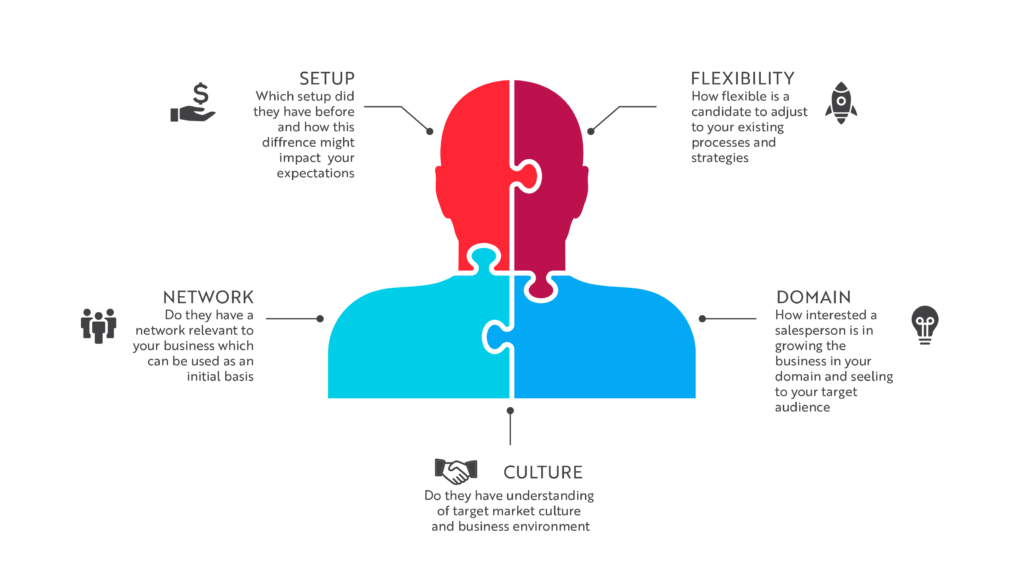The time has come – you decided to hire a salesperson. That’s great news. You are about to start a new exciting journey with a new team member. But how do you know exactly if this energetic and extremely enthusiastic person that you interview is a good fit for your team?
We’re not going to go through the classic list of requirements that a good salesperson needs to have – I’m sure you can easily find it yourself. We would rather consider the points which might be not obvious right away, but could make a big impact on the success of your mutual journey.
Hidden catch
You finally found a great person with superb skills, great track record, nice personality and proven achievements. What could go wrong? Well, there are still some points which might be hard to detect on the interview stage, but which will influence their further results.
Network
When you hire a salesperson into your team, you need to understand where, how and when they will work. You should have a specific market, business vertical or domain in mind which you want them to develop further. Network that they have is one of key success elements here.
It’s critical to understand that their existing network is one of the most powerful weapons they have on the initial stages. If they don’t have any relevant connections in the domain you work at, or on the key market locations – it will take them a while to build it from scratch.
There are lots of job openings requiring sales candidates to have experience in specific markets – domains, locations, product types etc. And very often it implies domain and product specific understanding. Network factor is quite often underestimated.
Let’s imagine you have a business in retail SaaS product. Of course one of the criteria for a candidate to get qualified would be understanding of the retail market, experience in this domain as well as selling SaaS. But do they have a relevant network? Can the people they know and are in touch with be considered as potential buyers or at least corresponding to your ICP? It’s very important to know the answers on these questions to understand how much time it will take the person to make a first sale and build your expectations respectively.
Culture understanding
Culture is another key point in a successful sales process. While it may sound very simple, that’s another frequently underestimated factor. Understanding the rules, principles and traditions of doing business on key target markets is critical. And you need to be sure that the person you are about to hire understands them. Or at least you have someone in your team who can share their knowledge. Each country has their own culture, and selling approaches differ as well. If you know how to sell on the American market, it does not mean that it will be efficient in Germany, for example. It won’t.
Sometimes this challenge is solved by hiring local sales people. They already have a relevant network, know the language and understand local culture. On the other hand, it does not mean that remote sales person cannot be efficient on that market too. They both can be equally successful with the right mix of skills and knowledge in hand.
Domain interest
If everyone loved their jobs, it would be utopia. But when it comes to sales this is actually quite important. I believe that sales is a state of mind, a very specific world view. Sales person that does not like their job, won’t be successful. And it’s not only about loving their job. It’s about loving what they sell and to whom.
Let’s come back to our Retail SaaS. Imagine your primary target audience which you focus on is in electronics and hardware. And your candidate worked in clothing retail software before. On the first sight it might seem a great match – they know the retail industry and SaaS specifics, understand companies’ buying habits, main objections and selling principles. But selling software to clothing companies is different to selling it to electronics ones. They might like the first and have zero interest in the second. Moreover, decision makers, stakeholders and ICPs will be different. Here we come back to network importance again.
From my personal experience – when it seems that you can sell anything to anyone – it’s not true. You don’t like everything in the world. And even if the product or service you sell is almost the same, the target domain or industry should be interesting as well. If your sales person does not like what they sell or to whom, they won’t dig deep, won’t learn as much as they can. And at the end of the day they will leave. So you need to be sure that they are not only great sales professionals, but are also interested in selling your product to your target audience.
Flexibility
It’s not a secret that a good salesperson should have a decent level of flexibility in order to adjust to continuously changing circumstances, market rules and tendencies. Apart from that, another important trait is their ability to integrate into an already existing setup.
If you already have a team with an established process, strategy and infrastructure, new member needs to be flexible enough to adopt them and stick to the common direction. Just because however great each of them is, they all work for one same goal – generate revenue for the company.
On the other hand, each good sales person has their own vision of approaches that work well for them. And it does not mean that you have to break them and put them into conditions which they won’t be productive at. But each team still has basic ground rules that should be followed by each team member. So when taking a new person, be sure that this point won’t become a problem. Otherwise, neither this new colleague, nor other ones won’t feel comfortable working with each other which might make the process even worse than it was before.
Previous setup
They might have closed million deals and might have shown amazing results in previous companies – no doubts. But what was the setup there? How big were those companies? Which processes did they have? How strong was marketing, brand awareness? How big was the sales budget? Was there good support from other departments?
It’s very important to understand all these points. Cause it’s obvious that selling Microsoft and selling Company X are 2 different things. And vice versa – if their resources were limited and results they achieved were remarkable, they are more likely to be efficient in the similar setup. Or if you give them better conditions, you can expect better results.
Be sure to discuss this during the interviewing process. And build your expectations respectively.

How to minimize risks
No one will ever give you a guarantee that the person you hired will be performing well. Even if they showed themselves great in the interviews. There’s always a chance that something might not work. By discussing the points mentioned above you can better understand their background and how interested they are in growing your business. Apart from that, there are a couple of things you can do after hiring.
Personality check
There are lots of personality tests existing. They will help you to understand the candidate’s values, way of thinking and attitude. I personally love to check their communication qualities and team roles profiles.
These 2 tests will help you with that. Belbin test will give you an overview of team roles that they are good for, and StraighTalk test will show you their communication style peculiarities.
Expectations management
If you checked all the points considered above and did not see any red flags, you still need to build a plan and adjust your expectations in accordance with it. In case of strong previous setup and limited possibilities in your company, you need to understand that the first results will take them more time to achieve. Or if their network is not perfect, building a new one will require time investments as well. Reasonable expectations will help you to avoid disappointment if the achievements might be not sufficient and keep your process productive.
Goals and KPIs
Setting up a clear and transparent analytical framework will help you both understand if they move well enough. You both need to be synchronized on what’s expected from them, how they should reach it and within which time frames. This point is an important step of expectations management. Moreover, apart from setting up their personal goals, you need to be sure that they correlate with the whole team’s ones.
Trial period
Too much pressure is never good. But some limitations are still good to have. After understanding their communication style and team roles, having expectations built and KPIs set – agree about the trial period within which they should show the first results.
When thinking about it be sure to check your average sales cycle duration as well as customer lifetime value. This will help you with understanding the time frames and results you can expect from them during the trial.
Review and adjust
While each salesperson is usually a strong personality, their work is still dependent on many other team members and factors. Be objective when assessing their work. Help them on the initial stages as much as you can and be sure that the team supports them too. Not only sales one, but everyone involved in product delivery, pre-sales, marketing and customer success. If overall tendencies seem good, even if the results could be better, keep on going. But be sure to review the process and make necessary adjustments regularly.
Summary
You just need to accept this ugly truth – hiring a great salesperson is hard. Just because if they are good, they can “sell” themselves to you. And there’s no guarantee that they will perform well in your team or correspond to your expectations.
Following these recommendations will help you to minimize the risk of failure. Even if something will go wrong at some stage – keep on looking.
“The pursuit of perfection often impedes improvement” – remember about it. Whatever happens, be sure to take each experience as a lesson. Analyze, adjust, move on.


